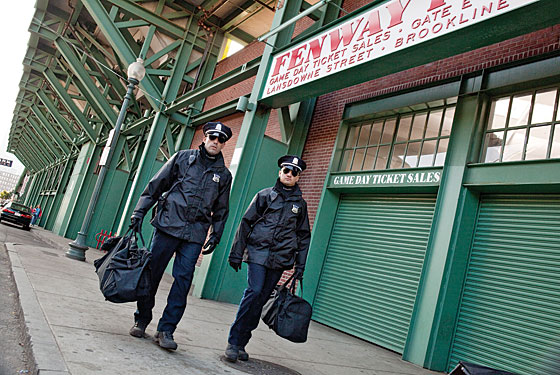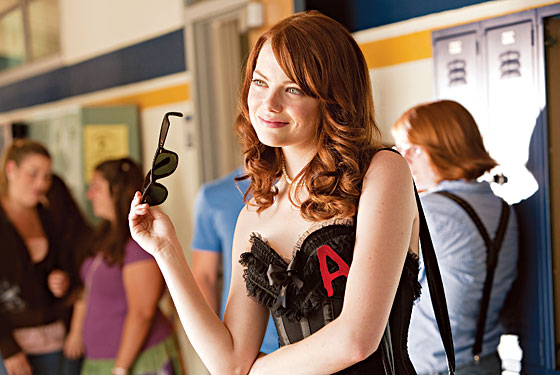
Ben Affleck can look slack-faced and vague, like a moose in the klieg lights, but he’s remarkably present (for him) in the socko crime thriller The Town. He’s the director as well as the star, and his watchful intelligence comes through—that and his tenderness toward the actors in his care. It helps that Affleck’s character, a career armed robber named Doug MacRay, has reasons of his own to be watchful. After MacRay and his gang (wearing skull masks) pull off a brutal bank job, a single-minded FBI agent (Jon Hamm) begins to close in—at which point MacRay’s edgy partner, Jem (Jeremy Renner), wants to track down and terrorize the bank manager (Rebecca Hall) whom they’d briefly taken hostage. MacRay knows that Jem is apt to get carried away and eliminate this one loose end, so he insists on threatening the woman himself, which he doesn’t get around to doing, on account of his falling in love with her. Will she find out he was the one with the gun to her head? Awkward.
The plot is Hollywood hokum, but the movie is called The Town rather than Prince of Thieves, the title of the Chuck Hogan novel on which it’s based, and Affleck makes the place the true protagonist; he treats its tribal customs with an anthropologist’s awe. The setting is predominantly Charlestown, a mile-long Boston neighborhood with a tradition of blue-collar crime, passed down like a trade, we’re told in the opening titles, from father to son. Affleck and his cinematographer, Robert Elswit, bring out the strangeness of its layout between the Charles and, yes, Mystic Rivers, as exposed and yet remote as Alcatraz, the Bunker Hill Monument rising impassively over its impenetrable neighborhoods. In an age in which so many films and TV shows are shot, for reasons of economy, in Toronto and Vancouver (standing in for Everycity), the movie’s rootedness is bracing.
Affleck is no lug when it comes to action, either. The camera bursts into the bank behind the robbers, swerving and whipping around as they smash past the teller desks and scream for the employees to hit the floor. Then we see the view through the security camera: black and white, stationary, dead silent. It’s a gimmicky transition—but a neat one! The skull masks are genius: They bring out the robbers’ otherness, their ghoulish lineage. But as Hall’s Claire fumbles with the safe, too terrified to get the combination right, something human slips out from behind MacRay’s bogeyman visage. “Take your time,” he says. “Breathe.” You half-expect him to give her a shoulder massage. The nearly six-foot Hall uses her size to express instability; she’s so endearingly vulnerable that you know why MacRay wants to protect her. Later, when she meets him in a laundromat and tells him about her ordeal, he has to work to keep her interests from outweighing his own.
The lovable armed robber is, of course, a sentimental conceit, but Renner keeps the film from going soft. I can’t think of an actor who does less “indicating”—i.e., showing instead of living it. In The Hurt Locker, he didn’t act the hot-dog bomb expert. He just strode toward a bomb as if he needed to defuse it to complete himself. In The Town, he doesn’t signal that Jem is a sociopath. He’s just a man who has to hurt people to maintain his sense of control. We can feel his drive toward destruction; we know he won’t, can’t forget about Claire and the threat to his sense of order. It’s a deeply unnerving performance, beyond good or evil.
Everyone in The Town shines, even Blake Lively, but it’s Chris Cooper as MacRay’s imprisoned dad who astounds. The performance is hard, almost completely internal, with the barest hint of disgust at his son’s credulity. This is Jon Hamm’s first meaty movie role since embodying—incomparably—one of the most conflicted characters in the history of television. On one hand, it’s disappointing that his FBI agent, Frawley, does little besides bark orders, stare down suspects, and lead his team in gun battles. On the other hand, his handsomeness comes through vividly on the big screen. And it’s good to see him off the booze!
The Town has its ding-a-ling touches, like Claire volunteering in a rec center for poor kids (how sweet), and a buried secret involving MacRay’s absent mom, and a final battle so overscaled it’s like War of the Worlds in Fenway Park. The denouement is a mistake. But it’s great to see actors go to (the) town.
How do I write about the marvelous Catfish without giving away too much of its bizarre trajectory? Very carefully. It’s a new-style narrative documentary that dramatizes the paradox of the Internet, which has made us all so much closer to one another yet created so many more ways for us to misrepresent ourselves. (It sets the table for the upcoming David Fincher–Aaron Sorkin Facebook drama, The Social Network.) For Catfish, directors Ariel Schulman and Henry Joost began shooting Schulman’s brother, a photographer named Nev, after an 8-year-old Michigan girl, Abby, contacted him via Facebook to ask if she could do a painting of a striking dance photo he’d just published. When it arrives, the painting is better than good; it captures the energy in the female dancer’s limbs, the sense of transcendence in her flight. The little girl, an Abigail Breslin type in photos, is a prodigy. Nev phones Abby’s mother, Angela, and then, as his list of Facebook friends from Abby’s circle grows, enters into an e-mail and phone relationship with her teenage half-sister, Megan, a ripely pretty blonde who says she longs for him day and night. Ariel Schulman and Joost follow the burgeoning romance avidly—which is, come to think of it, another upshot of modern technology. In an age when hi-def cameras are so affordable and you don’t have to pay for film, you can keep a nonstop video diary of just about anything. You never know where it will lead.

Obviously, Abby and Megan and their mother, Angela, are not exactly what they say they are, but what—and who—are they? When the trio—using Google Maps and a GPS—head off to rural Michigan in search of answers, Catfish develops a Blair Witch Project–like vibe. Maybe Facebook will claim three more victims! And here I must stop … except to say that the last two words of the end titles (they are “including Angela,” but you won’t know what they mean without the context) had me sobbing with joy. Although Catfish is opportunistic, even borderline exploitive, it gets at—by indirection, through the back door—the magic-carpet aspect of this scary new medium. Real people are so complicated and irreducible, you know?
If they’re real, that is. In the early scenes, Nev’s excitement over Megan seems naïve. He’s a good-looking guy—his nickname could be “Mr. Adorable”—and it’s hard to believe he’s spending months obsessed with someone thousands of miles away … unless, of course, he’s acting obsessed because it makes for a good movie. And that’s where I must throw up my hands, because I no longer fully trust my ability to tell real scenes from faked ones, especially in first-person narrative documentaries. Parts of Tarnation turned out to have been staged. Banksy’s Exit Through the Gift Shop was likely a prank—albeit one with its own satiric truth. I’m Still Here: Well, who can tell what’s sincere in that Cloud Cuckoo Land? We’ve always had to watch documentaries with a skeptical eye, with an awareness that reality—even in supposedly fly-on-wall depictions—can be so easily manipulated. But these days, it’s more insidious. All documentary filmmakers must be viewed as potential scam artists. Sorry, Fred Wiseman: We card everyone.
Much of the rambunctious teen comedy Easy A is delightful, much of it irritating. Your ratio will vary depending on your tolerance for camp—for the Glee-ification of teen (and tween) culture and its incessantly arch repartee. The movie turns on a lie: To seem less lame, loveless Olive Penderghast (Emma Stone) tells her best friend that she lost her V-card (virginity), and she’s overheard by the school’s Super Christian bovine blonde (Amanda Bynes). Deciding she’d rather be viewed as a slut than a pathetic liar, Olive sews an A (as in The Scarlet Letter) on her blouse and, out of the goodness of her heart, takes responsibility for other peoples’ sins, too. (It’s a liberal martyr’s Super Christianity.) The screenplay, by Bert V. Royal, is full of cheap shots at the squares, but if you don’t like one joke, there’s already another on the way. Lisa Kudrow does a dazzling turn as a guidance counselor who’s a flickering mixture of sympathy and narcissism. But the movie belongs to Stone, that gorgeous, husky-voiced redhead. When most actors deliver nonstop patter, their mouths get ahead of their minds, but Stone’s brain works so fast that her mouth can barely keep up. She has a near-telepathic link with the audience: She makes our brains run faster, too.
The Town
Warner Bros. Pictures. R.
Catfish
Universal Pictures. PG-13.
Easy A
Screen Gems. PG-13.
E-mail: [email protected].
